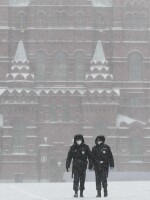Updated at 8:25 p.m. ET Tuesday
Belarusian authorities say an opposition leader who disappeared Monday has been detained by police while trying to flee the country for neighboring Ukraine.
Maria Kolesnikova was last seen Monday morning when masked men plucked her off the streets of central Minsk and sped off in a van, according to local media reports.
Kolesnikova's phone went silent. Her family filed a missing person's report. The country's Interior Ministry said it had no information on her whereabouts.
That all changed by early Tuesday.
Authorities said that Kolesnikova, 38, was arrested while trying to cross the border into Ukraine with two other opposition figures who also were thought to have gone missing.
Belarusian state media quoted government officials who insisted Kolesnikova had " ended up outside the vehicle" — perhaps being pushed by colleagues, who then went on to Ukraine.
Ukrainian officials, however, disputed that version of events.
"It wasn't a voluntary exit," Ukraine's deputy interior minister, Anton Gerashchenko, said in comments carried by the Interfax News Agency.
Gerashchenko said that Kolesnikova had destroyed her own passport to make her expulsion from Belarus impossible.
The murky episode surrounding Kolesnikova's whereabouts appears to be the latest in a series of attempts by Belarusian security forces to force opponents of longtime President Alexander Lukashenko into exile.
Kolesnikova emerged as a household name in Belarus as part of a trio of women who challenged Lukashenko's 26-year hold on the presidency this summer.
Uniting behind the candidacy of Svetlana Tikhanovskaya — a former schoolteacher who said she only entered the race after her husband's candidacy had ended in arrest — the women electrified crowds at campaign stops in the runup to the Aug. 9 election.
Official results told a different story: Lukashenko took 80% of the vote in a landslide. Tikhanovskaya got just 10%.
But widespread charges of vote-rigging have triggered a series of mass protests demanding Lukashenko's resignation.
Public anger has also been stoked by a police crackdown and some 7,000 arrests in the wake of the vote. Protesters have repeatedly emerged from the country's prisons bearing grim tales of beatings and torture.
Lukashenko insists he is the legitimate winner of the race and has sought security guarantees from Russia by blaming the protests on Western-backed saboteurs.
Until her arrest, Kolesnikova had been one of the few remaining high-profile opposition figures still operating freely in Belarus.
She served on an opposition-run "coordination council," a group trying to transition Belarus to a post-Lukashenko era.
Tikhanovskaya, the candidate who supporters argue won last month's election, fled abroad amid threats to her family following the vote. She has since taken to lobbying foreign governments and the United Nations from exile.
"The more they try to scare us, the more people will take to the streets," she said in a statement reacting to initial reports of Kolesnikova's disappearance.
U.S. Secretary of State Mike Pompeo said Tuesday that "the United States is deeply concerned," and commended "the courage of Ms. Kalesnikava and of the Belarusian people in peacefully asserting their right to pick their leaders in free and fair elections in the face of unjustified violence and repression by the Belarusian authorities."
Pompeo said the U.S. and its allies are considering "additional targeted sanctions to promote accountability for those involved in human rights abuses and repression in Belarus."
Some European leaders accused Lukashenko's government of trying to remove challenges to his leadership by using Soviet-style methods.
"Instead of talking to the people of #Belarus, the outgoing leadership is trying cynically eliminate one by one," Lithuanian Foreign Minister Linas Linkevicius wrote on Twitter.
"Stalinist NKVD methods are being applied in 21st century's Europe," he added.
Others viewed Kolesnikova's arrest as the latest misguided attempt to thwart a protest movement that has been largely self-organized from the outset.
In a Facebook post, activist Andrej Stryzhak called the incident part of "convulsive attempts" to cut off the head of the movement.
"The authorities can't seem to understand that the majority of Belarusians see themselves as the head of the protest whenever they look in the mirror," Stryzhak added.
Copyright 2020 NPR. To see more, visit https://www.npr.org. 9(MDAwMTM1NDgzMDEyMzg2MDcwMzJjODJiYQ004))


